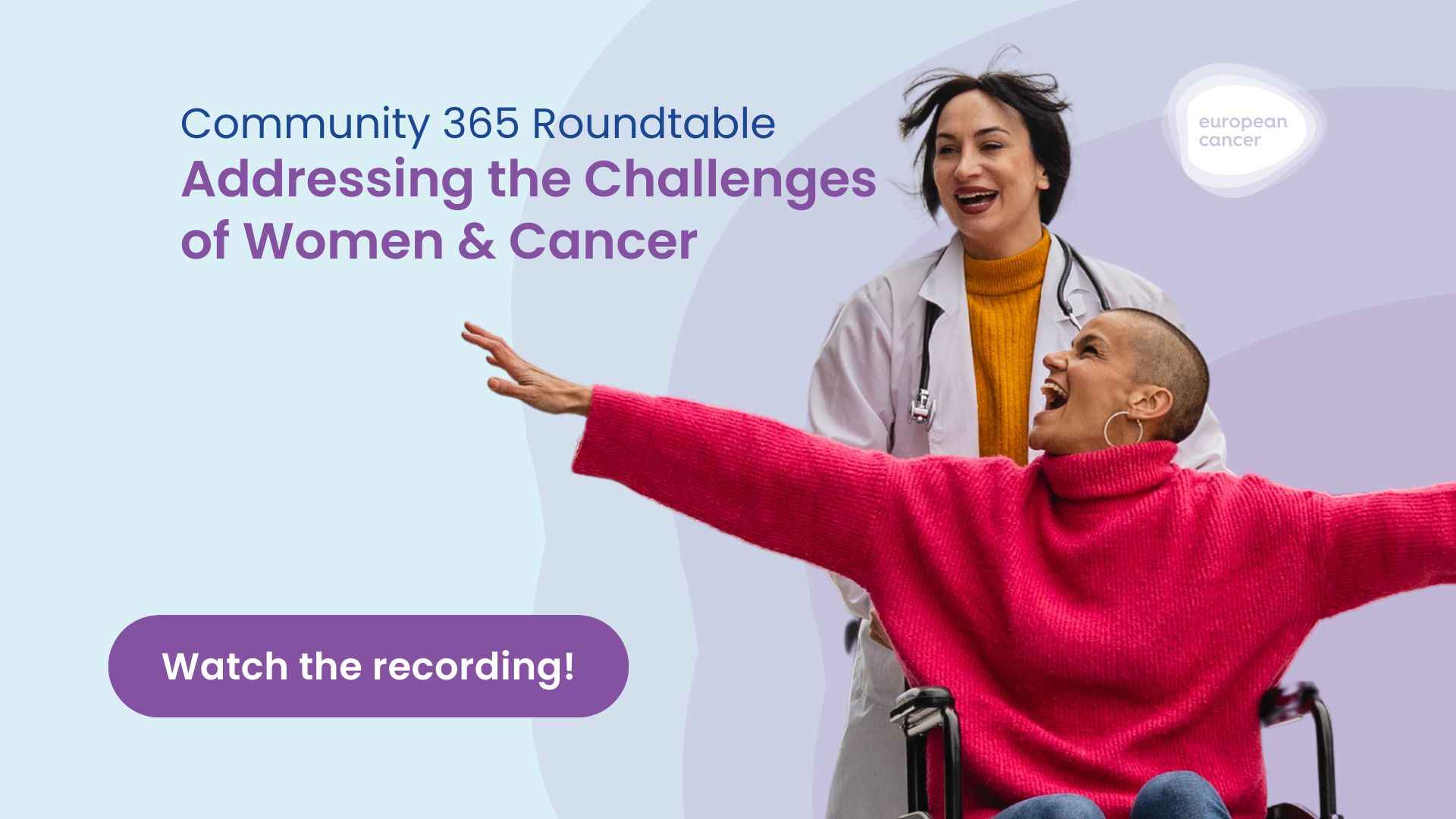Watch the recording now!
While advances in treatments have been made, breast, ovarian and cervical cancer continue to have the highest mortality rates amongst women. This Community 365 Roundtable focused on unmet needs of women affected by cancer – from metastatic breast survivors to the stigmatisation of gynaecological cancers.
Participants helped identify current policy gaps and actionable recommendations that can integrate ovarian cancer policy into EU and national health strategies. The goal? Ensure equitable access to cancer screening and emerging therapies that can improve survival and quality of life.
The Roundtable was chaired by:
- Dr Isabel Rubio, Co-chair of the ECO Women & Cancer Workstream & Past President of the European Society of Surgical Oncology
- Prof. Paola Erba, Co-chair of the ECO Women & Cancer Workstream & President of the European Association of Nuclear Medicine
Speakers
-
Romana Jerković MEP Vice-Chair, Committee on Public Health
-
Billy Kelleher MEP Member of the European Parliament
-
Fatima Cardoso President, ABC Global Alliance
-
Andrea Rockall Chair of the Board of Directors, European Society of Radiology
-
Tit Albreht President, European Public Health Association
-
Marzia Zambon Executive Director, EUROPA DONNA
Speakers
-
Romana Jerković MEP Vice-Chair, Committee on Public Health
-
Billy Kelleher MEP Member of the European Parliament
-
Fatima Cardoso President, ABC Global Alliance
-
Andrea Rockall Chair of the Board of Directors, European Society of Radiology
-
Tit Albreht President, European Public Health Association
-
Marzia Zambon Executive Director, EUROPA DONNA
-
Romana Jerković MEP Vice-Chair, Committee on Public Health
-
Billy Kelleher MEP Member of the European Parliament
-
-
-
-
-
Isabel Rubio Co-chair of the ECO Women & Cancer Workstream & Past President of the European Society of Surgical Oncology Read Bio
-
Paola Anna Erba Co-chair of the ECO Women & Cancer Workstream & President of the European Association of Nuclear Medicine Read Bio
-
Urška Košir Research Manager, Swedish Institute for Health Economics & Patient Advocate, Youth Cancer Europe Read Bio
-
-
Michael Zaiac Head of Medical Affairs Oncology Europe and Canada, Daiichi Sankyo
-
-
Victoria Clare Chief Executive Officer, Ovacome
-
Speakers
-
Romana Jerković MEP Vice-Chair, Committee on Public Health
-
Billy Kelleher MEP Member of the European Parliament
-
Fatima Cardoso President, ABC Global Alliance
-
Andrea Rockall Chair of the Board of Directors, European Society of Radiology
-
Tit Albreht President, European Public Health Association
-
Marzia Zambon Executive Director, EUROPA DONNA
Programme
15:00-15:15 |
Welcome and introductions |
15:15-15:55 |
Beyond survival: addressing metastatic breast cancer |
|
This session will provide an introduction to Metastatic Breast Cancer (MBC), outlining what it is and how research in this area has progressed — while emphasising the ongoing need for sustained funding and innovation. Thanks to advances in early detection and treatment, MBC is no longer considered an automatic death sentence. However, healthcare systems and societies must still adapt to the unique and complex challenges associated with living with MBC. The session will explore key issues around quality of life, long-term care, and survivorship, and will highlight the crucial role that policy can play in improving outcomes for people living with metastatic breast cancer. Co-chaired by Isabel Rubio, Co-chair of the ECO Women & Cancer Workstream & Past President of the European Society of Surgical Oncology, and Michael Zaiac, Head of Medical Affairs Oncology Europe and Canada, Daiichi Sankyo |
|
|
|
15:55 – 16:40 |
Managing challenges in gynaecological cancers: improving health literacy to take informed decisions |
|
Gynaecological cancers are among the most prevalent cancers affecting women in Europe – including young women which represent a vulnerable group - yet receive limited attention. They indeed remain under-recognised and often stigmatised, leading to delayed diagnoses and unmet care needs. There is an urgent need to ensure these cancers are fully integrated into national and regional cancer control plans. This session will consequently aim to raise awareness on the persistent challenges in managing gynaecological cancers, with a particular focus on supporting the right to fertility preservation. It will explore why fertility counselling should be made routinely available to all women undergoing cancer treatment, ensuring they are fully informed of their reproductive options and supported in making decisions. Co-chaired by Paola Anna Erba, Co-chair of the ECO Women & Cancer Workstream & President of the European Association of Nuclear Medicine, and Maja Velkovsky, Executive Director, Medical Affairs Gynaecological Cancers, MSD |
|
|
|
16:40-17:25 |
The cost of delay: addressing challenges in ovarian cancer diagnosis |
|
Ovarian cancer is one of the deadliest yet least understood and prioritised cancers affecting women. This session will explore critical barriers such as misdiagnosis and late diagnosis, poor integration of diagnostic technologies, limited awareness and treatment gap. It will finally explore the human impacts for patients diagnosed with ovarian cancer and will review ways to achieve better integration of ovarian cancer policy needs into EU and national women’s health strategies. Co-chaired by Isabel Rubio, Co-chair of the ECO Women & Cancer Workstream & Past President of the European Society of Surgical Oncology, and Nikki Roebuck, Senior Global Science Director, AbbVie |
|
|
|
17:25-17:30 |
Conclusions and next steps |
Speakers
-
Romana Jerković MEP Vice-Chair, Committee on Public Health
-
Billy Kelleher MEP Member of the European Parliament
-
Fatima Cardoso President, ABC Global Alliance
-
Andrea Rockall Chair of the Board of Directors, European Society of Radiology
-
Tit Albreht President, European Public Health Association
-
Marzia Zambon Executive Director, EUROPA DONNA
Speakers
-
Romana Jerković MEP Vice-Chair, Committee on Public Health
-
Billy Kelleher MEP Member of the European Parliament
-
Fatima Cardoso President, ABC Global Alliance
-
Andrea Rockall Chair of the Board of Directors, European Society of Radiology
-
Tit Albreht President, European Public Health Association
-
Marzia Zambon Executive Director, EUROPA DONNA


